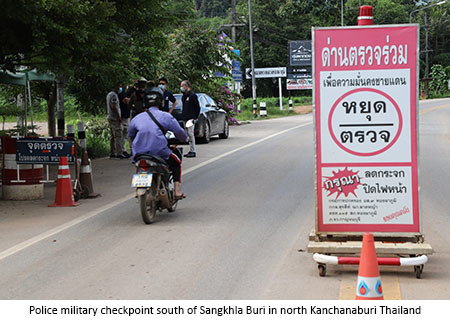
Kanchanaburi (Thailand), 25 September 2020 - A UNODC team of Regional Representative Jeremy Douglas, Programme Manager Giovanni Broussard and Programme Expert Zhiqiang Tao completed a three-day vulnerability assessment of the western border between Kanchanaburi in Thailand and Myanmar. In-depth meetings and briefings were held with Thai officials, as well as demonstrations and inspections at check-points and border crossings, in what has become a busy area for trafficking and smuggling over the past year.

Three Pagodas Pass at the Thailand Myanmar border in northern Kanchanaburi has been an active crossing point between the two countries for many years, and despite COVID-19 restrictions and recent closure measures it is has been increasingly used by transnational crime groups to traffic illicit contraband and people in 2020. Recent record synthetic and other drug seizures (methamphetamine, ketamine and some heroin) at the police / military inspection check-point in Sangkhla Buri on the road south from Three Pagodas Pass have confirmed a shift of trafficking routes from Mae Sai - Tachilek in the Golden Triangle and Mae Sot - Myawaddy in central Thailand towards this very complex, and in some respects over-looked, Thailand Myanmar border area.
The Three Pagodas Pass links communities in Sangkhla Buri in north Kanchanaburi Thailand to the town of Payathonsu in the south of Kayin State and nearby Mon State in Myanmar, connecting very different societies, cultures and economic systems, with a unique mix of disparities and border challenges. Official border trade has been strained by COVID-19 in 2020, but it has continued at reasonable levels when allowed, and there are indications some informal trade and trafficking has been taking place even during COVID-19 restrictions. This reality is a clear challenge for efficient and effective border management, and has been proven to be an opportunity for organized crime involved in trafficking of drugs, people, timber and wildlife.
Informal legal border crossings are also frequent in some places in the region. Bong Ti to the west of the provincial capital Kanchanaburi (city) is an example where locals can simply walk across the border to engage in local trade without any documents. And while drug trafficking is a clear concern and officials at these crossings have received some related assistance and training, and human trafficking was noted as a concern, wildlife and timber trafficking were not mentioned as a priority by the police or customs despite the fact there are national parks and important natural habitats for endangered or threatened species on both sides of the border. 
The need to focus on the area was highlighted by UNODC Representative Jeremy Douglas, who remarked after meeting officials, "the geography while stunning is an obvious challenge to contend with, and the capabilities of organized crime groups that have recently started using the Kanchanaburi border exceed the capacity of agencies that manage it – in fact this is an understatement.” He added, “there has been a noticeable increase in the trafficking of drugs this year, and we expect other goods as well, and the situation is likely to deteriorate further if the border does not get attention – all the elements organized crime look for are in place, including heavily armed ethnic groups in-charge of adjacent territory. Cross border cooperation needs to be prioritized, and local dynamics and governance challenges need to be accounted for."


UNODC has been liaising and working with partners in East and Southeast Asia since the pandemic lockdown to understand and respond to risks and opportunities, including by assessing cross-border movements and trends. The mission took place to look at measures that can be supported to mitigate risks and impact, and prepare for programming and assistance on the ground.
Click here to learn more about UNODC's Regional Programme for Southeast Asia
Click here to learn more about UNODC’s work on drug control in the region
Click here to learn more about UNODC’s work on environmental crime in the region
Click here to learn more about UNODC’s work on border management in the region